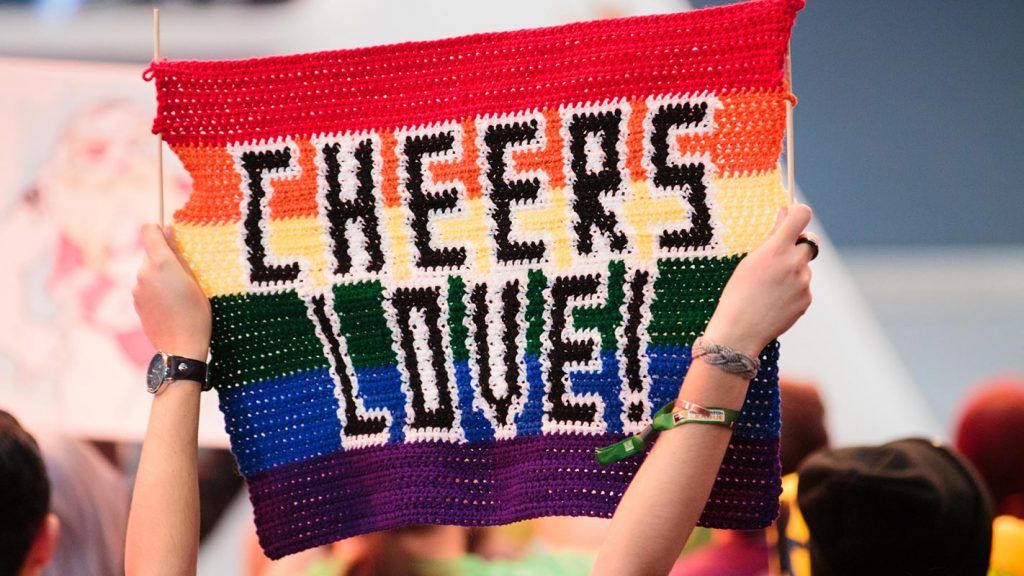The declaration of pride matters to many LGBT+ esports fans.
When Ellen DeGeneres came out through an episode of her self-titled sitcom in 1997, it changed the game for queer representation on television. “The Puppy Episode,” a double-episode from the fourth season of Ellen, drew around 42 million viewers, and won an Emmy Award for comedy writing. In the coming out scene, Ellen is self-critical, asking why she can’t say the word, why does she have to be so ashamed. When she finds the courage, she broadcasts over an airport PA the words “I’m gay.”
This declaration, over two decades old, reverberates through contemporary culture, and can still be felt in the ways in which queer people choose to make their gender and sexuality public. Laura Jane Grace, writer and singer for punk band Against Me! has become a powerful presence for trans and queer people, making inroads into a music scene that’s typically seen as male and straight. These people’s impact, both as success stories and the subsequent queer icons they went on to be in their fields, is also reflected in how pro gamer SonicFox presents his sexuality.
SonicFox is a multi-game champion, with a reputation that precedes him in the fighting game community (FGC). The nature of his public presentation of his sexuality came to a head at the end of last year, after he won “Esports player of the year” at the Game Awards in December. In his acceptance speech, SonicFox described himself as “everything a Republican hates,” which he attributes to being, in his own words, “gay, black, [and] a furry.”
This speech – and the choice of SonicFox as the esports player of the year – drew backlash. All over YouTube and Twitter, there were videos and threads about “why people don’t like SonicFox,” or about the way that people were made uncomfortable by the ways he makes his sexuality public. Despite the backlash, it’s a truth that to be openly queer is to make sexuality public and political. Nobody complains when an NFL athlete like Tom Brady makes his heterosexuality public; and the difference unveils already thinly veiled homophobia.
In the wake of this fallout, SonicFox doubled down, tweeting #IMGAY, an echo of his Game Awards speech when he said “gay, gay, gay” midway through it, constantly reminding people of his sexuality. The gleefully obnoxious hashtag caught fire among the FGC on Twitter; some people thought it was too much, others thought it was funny. But most importantly, among other queer people in the FGC, it spread like wildfire and became something of a rallying cry. People put it before their tags like it was some kind of sponsorship. The way that this gained traction among queer members of the FGC is a testament to the importance of a player like SonicFox, of what his achievements mean beyond just being achievements.

One of the most common points of criticism in response to SonicFox’s Game Awards speech, and #IMGAY Twitter spree is that it somehow takes away from his achievements, that it makes it about sexuality instead. But SonicFox’s ability and his being vocal about queerness don’t cancel each other out; his EVO wins across three different games (Injustice: Gods Among Us, Mortal Kombat X, and Dragon Ball FighterZ) can at once be a testament to his incredible individual skill, while also serving as a beacon for other players who see something of themselves in him. SonicFox himself brings this brazen openness towards queerness into his tournament play. In an interview (around an hour and eighteen minutes into this video of the Dragon Ball FighterZ world tour finals) during the world tour finals for Dragon Ball at the end of January, he leaned in to the camera and whispered: “I’m gay.”
In the end, a lot and a little has changed since ‘The Puppy Episode’ first aired in 1997. There have been obvious strides forward when it comes to queer rights and acceptance; the idea of queer characters on TV no longer feels quite as alien as it used to. But in spite of all that, on an individual level, it’s still easy to feel alone; like nobody else who travels in your circles is quite like you. Nobody is there to say, like Ellen, or SonicFox, “I’m gay.” And that’s where the importance and power of a player like SonicFox comes from: being so unapologetically open about sexuality is a welcoming call to other queer people who are either involved in the FGC but aren’t out, or simply feel like it isn’t for them because they feel like they might not belong in an arena that is incredibly heterocentric, and still almost entirely male.
With a player like SonicFox playing at the highest level across so many different games, it’s clear it’s possible to achieve great things in competitive gaming while also being openly and unapologetically queer. SonicFox’s presence and ability can serve as a beacon for change in the FGC, moving people towards being more understanding and accepting of queer people in the FGC and creating a space for people who would otherwise feel like they might not belong.
